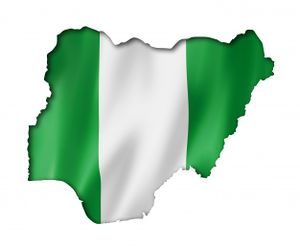Nigeria: Difference between revisions
Oyemi Sillo (talk | contribs) mNo edit summary |
Oyemi Sillo (talk | contribs) No edit summary |
||
| Line 8: | Line 8: | ||
=== Patient Access to Physiotherapy or Physical Therapy Services / Entry Point === | === Patient Access to Physiotherapy or Physical Therapy Services / Entry Point === | ||
[[File:Nigerian Map .jpg|thumb]] | |||
<br>In the Nigerian public health sector, physiotherapy services are available in the secondary and tertiary hospitals. Initial access to physiotherapy services for patients in public health facilities is often via referral from a physician. However, there is direct access to physiotherapy in Nigeria, and patients of both private and public health services are able to refer themselves to a physiotherapist without going through another health professional.<ref name=":0">https://world.physio/membership/nigeria</ref> | |||
< | Physiotherapists in Nigeria have clinical autonomy; they may assess patients, make diagnoses, provide treatment and/or prevention services, and refer to other health services.<ref name=":0" /> Also, physiotherapists are permitted to offer private services to patients as long as they maintain their registration/licensure. | ||
== Therapist Preparation == | == Therapist Preparation == | ||
== Degree/Credentialing | == Degree/Credentialing == | ||
In Nigeria, entry-level physiotherapy education is a 5-year Bachelor of Physiotherapy programme.<ref>Medical Rehabilitation Therapists (Registration) Board of Nigeria. Harmonized curriculum of studies for the Bachelor of Physiotherapy (B.PT) degree programme in Nigerian universities. 2009. http://www.mrtbnigeria.org/docs/curr/BPTCurriculum.pdf. </ref> Only seven universities presently run entry-level physiotherapy programmes, and four of them also have postgraduate (Advanced Masters and Doctor of Philosophy) physiotherapy courses.<ref>https://www.wcptafrica.org/education-practice/physiotherapy-education-programs-in-africa/</ref> | |||
New graduates of physiotherapy must undergo a 1-year internship in an accredited hospital. Successful completion of the clinical internship provides eligibility to apply for a full practicing license, which is renewable annually. The Medical Rehabilitation Therapists Board of Nigeria (MRTB) regulates academic and internship programmes, as well as clinical practices, of physiotherapy and other rehabilitation professions.<ref>https://www.mrtb.gov.ng/en/Registration/Application-for-Internship</ref> | |||
<br> | <br> | ||
| Line 19: | Line 24: | ||
== Specialization == | == Specialization == | ||
<br> | Specialization as a Physiotherapist in Nigeria is typically gained through post-graduate physiotherapy studies. | ||
<br>The Nigerian Society of Physiotherapy has the following Special Interest Groups:<ref>https://www.nsphysio.org/nsp-specialty-groups</ref> | |||
* Musculoskeletal Physiotherapy | |||
* Cardio-Pulmonary Physiotherapy | |||
* Paediatric Physiotherapy | |||
* Neurological Physiotherapy | |||
* Exercise and Sports Physiotherapy | |||
* Women’s Health Physiotherapy | |||
* Community Physiotherapy | |||
* Palliative Care Physiotherapy | |||
== Professional Associations == | == Professional Associations == | ||
< | There are about 2,450 registered physiotherapists currently practicing in Nigeria. The [https://www.nsphysio.org/ Nigeria Society of Physiotherapy] (NSP), the main professional association of Physiotherapists in Nigeria, was formed in 1959, gained federal government recognition in 1962, and became a member of [https://world.physio/ World Physiotherapy] in 1967. The NSP had 722 physiotherapists as members, as at 2020.<ref name=":0" /><br> | ||
<br> | |||
<br> | <br> | ||
== Information about the Patient Community == | == Information about the Patient Community == | ||
Revision as of 22:51, 28 March 2021
Original Editor - Your name will be added here if you created the original content for this page.
Top Contributors -
Patient Access to Physiotherapy or Physical Therapy Services / Entry Point[edit | edit source]
In the Nigerian public health sector, physiotherapy services are available in the secondary and tertiary hospitals. Initial access to physiotherapy services for patients in public health facilities is often via referral from a physician. However, there is direct access to physiotherapy in Nigeria, and patients of both private and public health services are able to refer themselves to a physiotherapist without going through another health professional.[1]
Physiotherapists in Nigeria have clinical autonomy; they may assess patients, make diagnoses, provide treatment and/or prevention services, and refer to other health services.[1] Also, physiotherapists are permitted to offer private services to patients as long as they maintain their registration/licensure.
Therapist Preparation[edit | edit source]
Degree/Credentialing[edit | edit source]
In Nigeria, entry-level physiotherapy education is a 5-year Bachelor of Physiotherapy programme.[2] Only seven universities presently run entry-level physiotherapy programmes, and four of them also have postgraduate (Advanced Masters and Doctor of Philosophy) physiotherapy courses.[3]
New graduates of physiotherapy must undergo a 1-year internship in an accredited hospital. Successful completion of the clinical internship provides eligibility to apply for a full practicing license, which is renewable annually. The Medical Rehabilitation Therapists Board of Nigeria (MRTB) regulates academic and internship programmes, as well as clinical practices, of physiotherapy and other rehabilitation professions.[4]
Specialization[edit | edit source]
Specialization as a Physiotherapist in Nigeria is typically gained through post-graduate physiotherapy studies.
The Nigerian Society of Physiotherapy has the following Special Interest Groups:[5]
- Musculoskeletal Physiotherapy
- Cardio-Pulmonary Physiotherapy
- Paediatric Physiotherapy
- Neurological Physiotherapy
- Exercise and Sports Physiotherapy
- Women’s Health Physiotherapy
- Community Physiotherapy
- Palliative Care Physiotherapy
Professional Associations[edit | edit source]
There are about 2,450 registered physiotherapists currently practicing in Nigeria. The Nigeria Society of Physiotherapy (NSP), the main professional association of Physiotherapists in Nigeria, was formed in 1959, gained federal government recognition in 1962, and became a member of World Physiotherapy in 1967. The NSP had 722 physiotherapists as members, as at 2020.[1]
Information about the Patient Community[edit | edit source]
Social/Cultural Influences[edit | edit source]
Delivery of Care[edit | edit source]
Type of Health System[edit | edit source]
Payment System[edit | edit source]
References[edit | edit source]
- ↑ 1.0 1.1 1.2 https://world.physio/membership/nigeria
- ↑ Medical Rehabilitation Therapists (Registration) Board of Nigeria. Harmonized curriculum of studies for the Bachelor of Physiotherapy (B.PT) degree programme in Nigerian universities. 2009. http://www.mrtbnigeria.org/docs/curr/BPTCurriculum.pdf.
- ↑ https://www.wcptafrica.org/education-practice/physiotherapy-education-programs-in-africa/
- ↑ https://www.mrtb.gov.ng/en/Registration/Application-for-Internship
- ↑ https://www.nsphysio.org/nsp-specialty-groups







